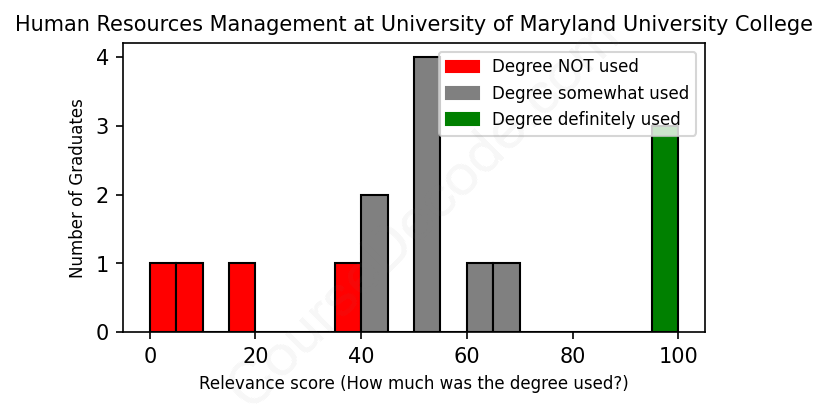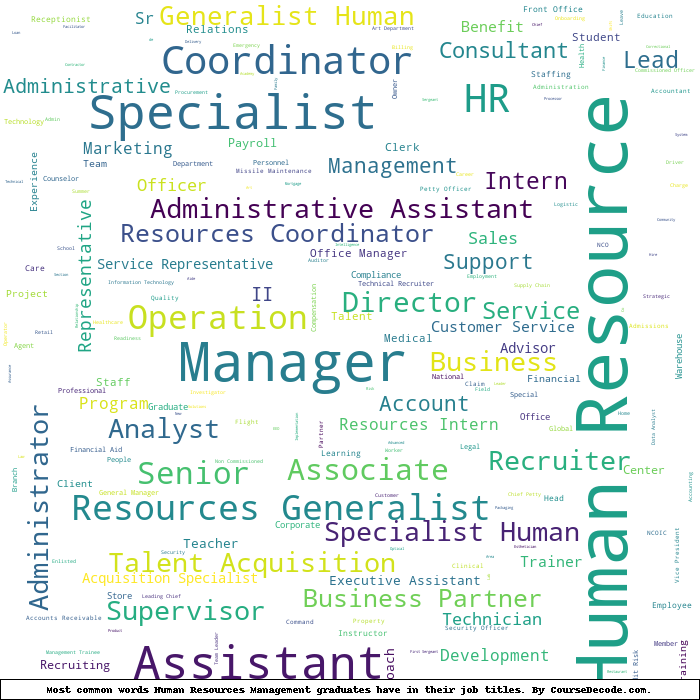
First, some facts. Of the Human Resources Management graduates from University of Maryland University College we've analyzed , here's how many have used (or NOT used) their degree in their career:

These are estimates based on AI analysis of 15 LinkedIn profiles (see below).
The verdict? Significantly below average. Overall, with an average relevance score of 51%, Human Resources Management graduates from University of Maryland University College have a much lower likelihood (-16%) of finding work in this field compared to the average graduate across all fields:
And for comparison, here's the chart for all profiles we've looked at across all degrees.
Also, after graduating, only 20% of these graduates have pursued further education other than another Bachelor's degree (such as a Masters degree or other), compared to the average across all profiles of 35%. This suggests a Bachelors degree is enough for most Human Resources Management graduates, and it's normal to look for work straight after graduation.
See the details:
|
Relevance score: 50% We think this person has gone into a career only somewhat relevant to their degree. We think this person has gone into a career only somewhat relevant to their degree.
DEGREE INFOGraduated in 2016 from University of Maryland University College with a Bachelors of Science in Human Resources in Human Resources Management. No other secondary education since. JOB HISTORY SINCE GRADUATIONActively helping a few companies with HR and culture changes, and investing time in my children Stay at Home Mom Sep 2016 - Present ABOUTNo information provided. |
The top 10 most common jobs done by the graduates we've analyzed (ranked most common to least) are:
After going through the job histories of graduates from the University of Maryland University College with degrees in Human Resources Management, it looks like there’s a mix of roles that align closely with HR principles and those that wander far from the field. Many graduates ended up in positions related to food service, healthcare, and technical operations. For example, roles like Food Service Advisor or Certified Pharmacy Technician don’t really tap into HR skills and seem more focused on operational functions. However, some graduates did find their way into roles like HR Assistant, HR Coordinator, and Employment Specialist, which showcase their HR knowledge and skills effectively.
In general, while there are definitely some relevant positions that make good use of the Human Resources Management education, a notable number of graduates have taken jobs that don’t utilize their degree directly. Many of these roles are in different industries that focus more on management, project coordination, or technical skills rather than specific HR practices. It’s clear that the field of HR offers several paths, but not all graduates have swung into HR-focused careers after completing their studies. So, it really varies from person to person!
Here is a visual representation of the most common words in job titles for Human Resources Management graduates (this is across all Human Resources Management graduates we've analyzed, not just those who went to University of Maryland University College):

The graduates from the University of Maryland University College who studied Human Resources Management seem to have a pretty varied career path after finishing their degrees. For many, their first job tends to be within roles that directly relate to HR or employee management, such as HR Assistants, Employment Coordinators, or even HR Interns. This makes sense because graduates are often eager to jump into associated fields right out of college, leveraging their education to gain real-world experience. We also see some graduates starting in related roles like food service or quality assurance positions before shifting toward more specialized HR functions after a couple of years of work experience.
Fast forward about 5 to 10 years down the line, and many alumni have advanced significantly within the HR space or in related fields. Some have reached titles like Human Resources Manager or HR Consultant, while others branch out into project management or operational roles that still utilize HR skills. However, there are also a few who seem to have wandered off the direct HR path, taking on roles in other sectors that may not tie back to their degree, such as teaching or even becoming self-employed in unrelated fields. Overall, it looks like many graduates have found opportunities in HR or relevant areas, but there’s a noticeable mix, especially in how consistent that career trajectory is across the board. So, while the degree offers a solid foundation for a career in Human Resources, the paths taken afterward can greatly vary from individual to individual.
Honestly, a Bachelor’s degree in Human Resources Management tends to lean towards the easier side compared to some other fields, but that doesn't mean it's a walk in the park! At the University of Maryland University College (now actually called University of Maryland Global Campus), you’ll cover topics like organizational behavior, employment law, and compensation strategies, which are pretty interesting but can require a fair amount of reading and writing. If you stay organized and stay on top of your assignments, you’ll likely find it manageable. Overall, it’s a solid choice for a degree that balances practical knowledge with not being overly intense, making it a decent fit for many students.
Most commonly, in the LinkedIn profiles we've looked at, it takes people 3 years to finish a Bachelor degree in Human Resources Management.
Looking at the jobs these HR Management graduates from the University of Maryland University College have held, it seems like many of them are doing decently well in terms of earnings. The ones who graduated a bit earlier, especially around 2010 to 2015, have climbed the ranks in organizations with titles like "Senior Capability Developer" and "DSO Shift Manager," indicating they’ve managed to snag some pretty solid paychecks. Even the more recent grads starting from 2018 and beyond have landed roles in good organizations like the Department of State and the Defense Intelligence Agency, which typically offer competitive salaries. While it's hard to say exactly how much they're making without specific numbers, it seems like most of them have found a path that could lead to a comfortable income. Overall, these folks appear to be on the right track when it comes to their financial futures!
Here is a visual representation of the most common words seen in the "about" section of LinkedIn profiles who have a Bachelor degree in Human Resources Management (this is across all Human Resources Management graduates we've analyzed, not just those who went to University of Maryland University College). This may or may not be useful:

Here are all colleges offering a Bachelor degree in Human Resources Management (ordered by the average relevance score of their Human Resources Management graduates, best to worst) where we have analyzed at least 10 of their graduates:
| College | Score | Count |
|---|---|---|
 San Jose State University San Jose State University
|
83 | 14 |
 Western Governors University Western Governors University
|
71 | 50 |
 Saint Leo University Saint Leo University
|
71 | 12 |
 Davenport University Davenport University
|
71 | 11 |
 Capella University Capella University
|
70 | 15 |
 Rutgers University Rutgers University
|
67 | 14 |
 Southern New Hampshire University Southern New Hampshire University
|
66 | 30 |
 Lindenwood University Lindenwood University
|
64 | 11 |
 DeVry University DeVry University
|
63 | 31 |
 University of Maryland Global Campus University of Maryland Global Campus
|
61 | 22 |
 Upper Iowa University Upper Iowa University
|
61 | 12 |
 Columbia Southern University Columbia Southern University
|
59 | 28 |
 Central Michigan University Central Michigan University
|
57 | 15 |
 Colorado Technical University Colorado Technical University
|
57 | 16 |
 American InterContinental University American InterContinental University
|
56 | 24 |
 University of Phoenix University of Phoenix
|
55 | 90 |
 Ashford University Ashford University
|
52 | 36 |
 American Military University American Military University
|
52 | 13 |
 Park University Park University
|
52 | 21 |
 University of Maryland University College University of Maryland University College
|
51 | 15 |
 Strayer University Strayer University
|
47 | 31 |